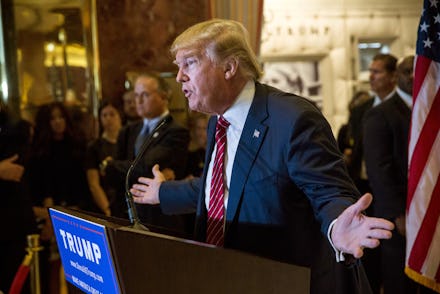What is the AMT? Here's why Donald Trump owed a $31 million alternative minimum tax bill

The world got a peek at President Donald Trump's financial history Tuesday night after MSNBC's Rachel Maddow released Trump's 2005 federal tax return during her 9 p.m. segment.
Shortly before the segment, the White House confirmed Trump paid $38 million in taxes on $150 million in income, the vast majority of which, $31 million, was due to the alternative minimum tax, a tax Trump has called to repeal. Without the AMT, Trump would have paid only about 4% of income as his effective tax rate; with it he paid about 25%.
Why? According to the newly released returns, Trump and his wife Melania paid $5.3 million (the 4% effective rate) in federal income tax for the year 2005, the Daily Beast reported. One reason why the bill was so low is because in 1995, Trump declared a $916 million loss he was able to carry forward, which was first reported by the New York Times and explained here by Mic.
But regular federal income tax obviously wasn't the only tax Trump ended up paying that year: Once the AMT was factored in, the amount owed went up to $38 million. Here's why the AMT multiplied Trump's bill.
What is the alternative minimum tax?
The alternative minimum tax is sort of like a backstop against excessive tax evasion. Its origins date back to 1969, when a scandal erupted after the Treasury Department announced that hundreds of people with incomes in excess of $200,000 had not paid any federal income tax.
In response, Congress eventually passed what's now known as the AMT.
The idea of the AMT is to keep the very wealthy from taking advantage of too many loopholes and avoiding paying their fair share. Whether — because of "bracket creep" — the tax now unfairly affects people who are merely middle (well, upper-middle) class is another debate: The Brookings Institution noted that the tax now affects a little less than 5 million filers, and Congress in 2015 indexed the tax to inflation in order to prevent that very bracket creep.
Odds are, the AMT isn't really something that affects you — less than 3% of people who pay the tax make less than $200,000 a year, according to the Tax Policy Center. If you do think you might owe the tax, using an IRS tool can help you figure out if it actually applies to you.
You are more likely to owe the tax if you are married, have a large family and live in a state with high income tax — investors with income from capital gains could also be affected. The AMT prevents you from getting many tax breaks, including deductions for state and local taxes; personal exemptions; and the standard deduction, as USA Today has reported.
While the overall amount of tax Trump paid isn't necessarily surprising, it is worth noting that a majority of the overall bill was due to the AMT, which Trump has vowed in the past to scrap in the past.
The tax documents were originally obtained by the journalist David Cay Johnson, and also published on DCReport. In a statement, the White House called the release of the tax return "illegal," though MSNBC said in a statement that the publication is protected by the First Amendment.